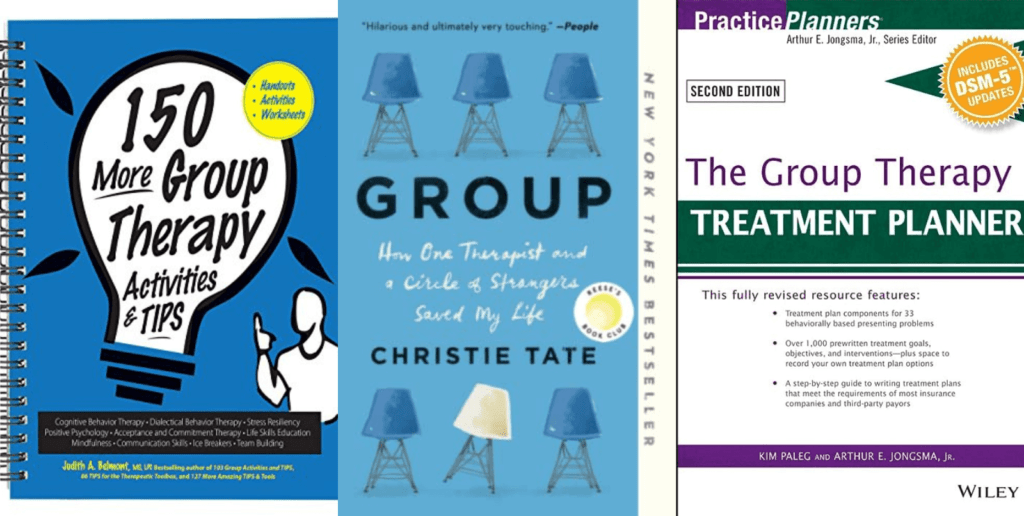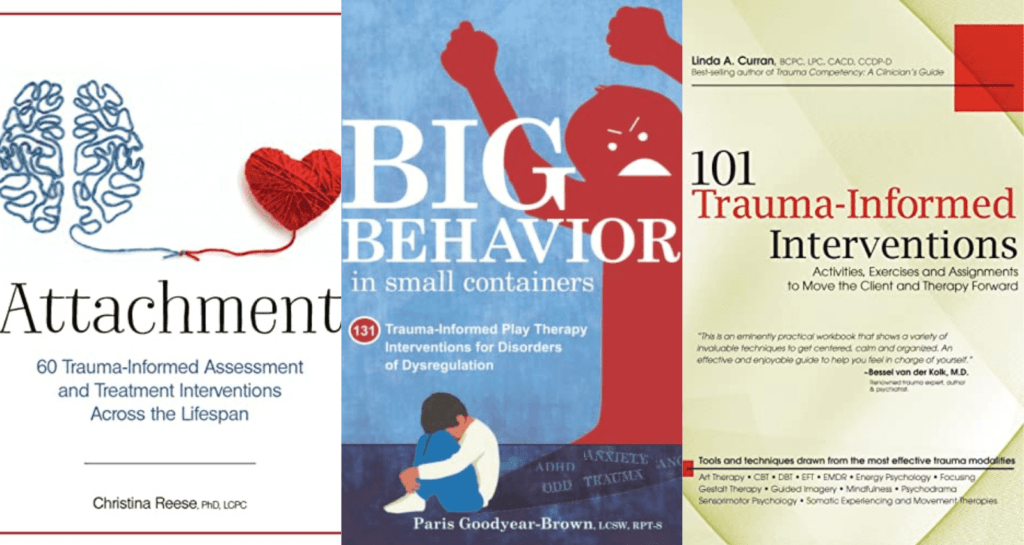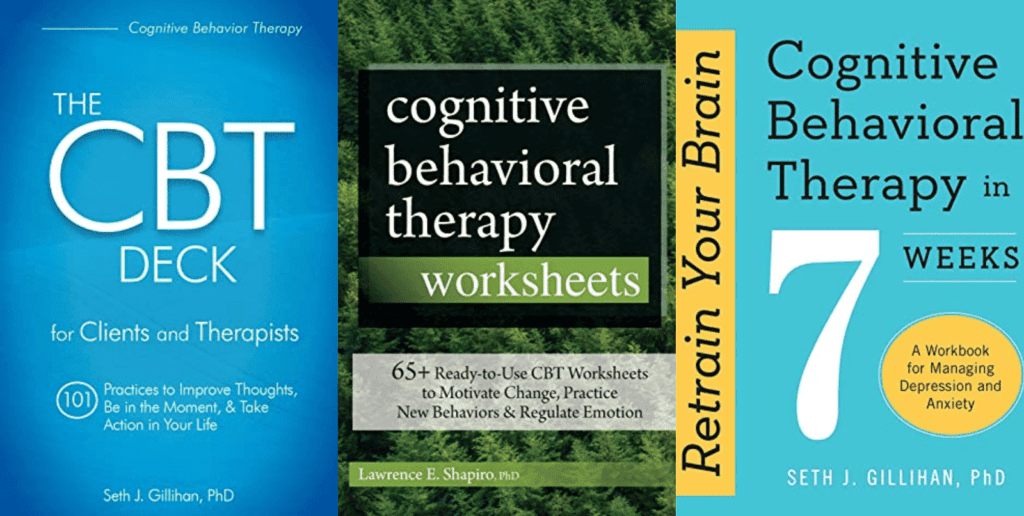The following are some of the best group therapy books.
- Group Therapy Books
- 1. Group
- 2. 150 More Group Therapy Activities & TIPS
- 3. 103 Group Activities and TIPS
- 4. The Group Therapy Card Deck
- 5. The Theory and Practice of Group Psychotherapy
- 6. The Group Therapy Treatment Planner, with DSM-5 Updates
- 7. Engage the Group, Engage the Brain
- 8. Solution Focused Group Therapy
- 9. Ten Great Therapy Groups
- 10. Creating Healing Circles
- How Group Therapy Books Can Help?
- Conclusion
Disclosure: Some of the links below are affiliate links. This means that, at zero cost to you, I will earn an affiliate commission if you click through the link and finalize a purchase.
Group Therapy Books
1. Group
By Christie Tate

In this thought-provoking book, the author recounts her own journey of self-discovery, healing, and personal growth through her experiences in group therapy sessions.
Christie Tate, the author, bravely shares her struggles with mental health, relationships, and personal identity. With honesty and vulnerability, she takes readers on a poignant exploration of her path to healing, aided by her therapist and the supportive community she finds in group therapy.
Through her narrative, Tate offers insightful observations about the dynamics of group therapy and its potential to provide individuals with a sense of belonging, understanding, and acceptance. She highlights how the sharing of experiences and emotions within a safe and confidential space can foster empathy, connection, and personal growth.
Related: Best 10 CBT Therapy Books
2. 150 More Group Therapy Activities & TIPS
By Judith A. Belmont

Judith A. Belmont, the author, draws upon her extensive experience as a therapist to present a diverse range of activities that can be easily implemented in group therapy sessions. Each activity is designed to address specific therapeutic goals, such as building trust, improving communication skills, enhancing self-awareness, and fostering emotional support within the group dynamic.
The book covers various topics, including icebreakers, trust-building exercises, mindfulness activities, creative expression techniques, and problem-solving strategies. These activities are accompanied by clear instructions, tips, and discussion prompts, making it easy for therapists to adapt them to the unique needs and goals of their specific groups.
Related: Top 100 Therapy Questions
3. 103 Group Activities and TIPS
By Judith Belmont

This illustrated spiral-bound book offers a wide range of activities and strategies that can be implemented to promote communication, enhance self-awareness, and improve overall group dynamics.
The activities are carefully organized and cover various topics including icebreakers, trust-building exercises, mindfulness techniques, problem-solving strategies, and creative expression exercises. Each activity is accompanied by clear instructions, facilitating ease of implementation for therapists and group leaders.
This book goes beyond merely providing activities and includes valuable tips and practical strategies for engaging and motivating participants. The author emphasizes the importance of creating a safe and supportive environment, promoting active participation, and fostering open communication within the group.
Related: Best 23 Therapist Gifts Ideas
4. The Group Therapy Card Deck
By Judith Belmont

This paperback deck of cards provides a collection of evidence-based techniques and strategies from cognitive-behavioral therapy (CBT), dialectical behavior therapy (DBT), acceptance and commitment therapy (ACT), and positive psychology.
In this deck, Judith Belmont offers an array of therapeutic tools that can be implemented in group therapy settings to promote personal growth, build resilience, and enhance well-being. Each card corresponds to a specific technique or activity, making it easy for therapists to select and integrate appropriate interventions into their sessions.
The deck covers a wide range of therapeutic topics, including cognitive restructuring, emotion regulation, mindfulness exercises, values clarification, gratitude practices, and self-compassion activities. The concise instructions provided on each card guide therapists and group leaders in effectively facilitating the selected techniques, ensuring a seamless and impactful group experience.
Related: Best 10 Narrative Therapy Books
5. The Theory and Practice of Group Psychotherapy
By Irvin D. Yalom, Molyn Leszcz

Drawing on their vast experience as renowned psychotherapists, Yalom and Leszcz explore various therapeutic approaches and provide valuable insights on how to effectively lead and facilitate group therapy sessions. They discuss different types of groups, including process-oriented, psychodynamic, cognitive-behavioral, and experiential groups, and offer guidance on selecting the most suitable approach for specific client populations and treatment goals.
The book covers essential topics such as group dynamics, establishing a therapeutic alliance, dealing with resistance and difficult behaviors, managing co-leadership, and handling termination.
In addition to discussing theoretical foundations, the authors provide numerous case examples, clinical vignettes, and transcripts of actual group therapy sessions to illustrate key concepts and techniques. They offer practical advice on handling common challenges that arise in group therapy, such as conflict resolution, managing power dynamics, and addressing issues of transference and countertransference.
Related: FREE Therapy Journal Template
6. The Group Therapy Treatment Planner, with DSM-5 Updates
By David J. Berghuis, Kim Paleg

In this updated second edition, the authors provide a comprehensive collection of pre-written treatment plan components, goals, and objectives that align with the criteria outlined in the Diagnostic and Statistical Manual of Mental Disorders, Fifth Edition (DSM-5).
This book serves as a valuable resource to help therapists develop individualized treatment plans for clients participating in group therapy. It presents a wide range of evidence-based interventions and strategies for addressing various mental health conditions, including anxiety disorders, mood disorders, substance use disorders, personality disorders, and more.
The treatment planning sections are organized by specific diagnoses, allowing clinicians to quickly locate the appropriate interventions and tailor them to meet the unique needs of their group members. Each treatment plan component includes detailed descriptions of the therapeutic techniques to be used, as well as guidelines for monitoring progress and assessing the effectiveness of the interventions.
Related: Best 9 Nonfiction Books About Mental Health
7. Engage the Group, Engage the Brain
By Kay Colbert, Roxanna Erickson-Klein

This book offers a collection of 100 experiential activities specifically designed to stimulate the brain and promote meaningful discussions and insights within the context of addiction treatment.
The authors recognize the importance of incorporating experiential techniques in addiction therapy as they can deepen the therapeutic process, enhance self-awareness, and foster a sense of connection among group members. The activities included in this book are diverse and cover a wide range of topics such as relapse prevention, coping skills development, self-esteem building, emotional regulation, and interpersonal relationships.
Each activity is accompanied by clear instructions, including materials needed, guidelines for facilitation, and suggestions for processing the experience afterward. The authors also provide additional tips and variations to adapt the activities to different group dynamics or specific client needs.
Related: CBT Worksheets Bundle (FREE PFD Download)
8. Solution Focused Group Therapy
By Linda Metcalf

Metcalf introduces the core principles of solution-focused therapy and demonstrates how these principles can be applied within a group therapy context. The book offers a step-by-step approach to organizing and structuring solution-focused group sessions, making it accessible for both novice and experienced therapists.
Throughout the book, Metcalf provides numerous case examples and stories to illustrate the application of solution-focused techniques in group therapy. She also offers specific exercises and interventions that can be used to engage group members, promote collaboration, and enhance problem-solving skills.
The author emphasizes the collaborative nature of solution-focused group therapy, encouraging group members to share their expertise and support each other’s growth and progress.
Related: Best 6 Mindfulness Exercises For Beginners (+FREE Resources)
9. Ten Great Therapy Groups
By Kristen Brown LCSW

In this book, Brown provides therapists with ten complete therapy group curricula that are organized in a user-friendly workbook format. The curricula cover a range of topics and therapeutic approaches specifically designed to address the unique challenges faced by individuals dealing with substance abuse and mental health concerns.
Each group curriculum includes session outlines, handouts, and interactive exercises that therapists can easily implement in group settings. The workbook format makes it simple for therapists to follow along and adapt the materials to meet the specific needs of their clients.
Brown emphasizes the importance of creating a supportive and healing environment within the therapy group. She provides guidance on how to establish group norms, encourage open communication, and foster a sense of trust and safety among group members.
Related: Best 8 Mindfulness Exercises For Adults That Will Help You Regulate Your Emotions
10. Creating Healing Circles
By Chris Burris, M.Ed, LCMHCS, LMFT

This book outlines practical strategies and techniques for incorporating IFS into group therapy settings to promote healing and growth.
Through the lens of the IFS Model, therapists will learn how to facilitate exploration and understanding of the different parts present in each group member. Burris offers specific interventions and exercises to help individuals identify and work with their parts, ultimately leading to greater integration and inner harmony.
Related: Best 10 Acceptance And Commitment Therapy Books

How Group Therapy Books Can Help?
Group therapy books can be a valuable resource for therapists facilitating group therapy sessions. Here are some ways in which these books can be helpful:
1. Group dynamics: Books on group therapy provide insights into the dynamics that occur within a therapeutic group setting. They explain the stages of group development, role assignments, and common challenges that arise. Therapists can gain a deeper understanding of group processes and learn how to manage conflicts, encourage cohesion, and foster a safe and supportive environment.
2. Structure and planning: Group therapy books often offer guidance on structuring sessions, creating therapeutic goals, and designing activities and exercises specific to group settings. They provide practical strategies for setting up ground rules, facilitating discussions, and promoting engagement among group members.
3. Group therapy techniques: These books present a range of therapeutic techniques that can be applied in group settings. They offer specific interventions, exercises, and activities to address various group therapy goals, such as developing communication skills, enhancing self-awareness, or promoting interpersonal growth. Therapists can learn different approaches, tailor them to their specific group’s needs, and implement them effectively.
4. Ethical considerations: Books on group therapy often discuss ethical considerations unique to group settings. They explore issues related to confidentiality, boundaries, informed consent, and managing dual relationships. Therapists can stay informed about best practices and ethical guidelines to ensure they provide ethical and responsible care to their group members.
5. Troubleshooting and handling common issues: These books address common challenges that can arise during group therapy, such as resistance, group conflicts, or members dominating the conversation. They provide strategies for troubleshooting these issues and offer guidance on how to maintain a balanced and productive group dynamic.
Conclusion
Group therapy books assist therapists in understanding group dynamics, planning and implementing group sessions, learning various therapeutic techniques specific to groups, handling common issues, and fostering their professional growth as group therapy facilitators.



